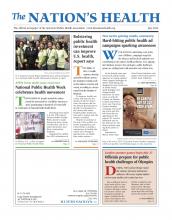The U.S. workforce is seriously sleepy, according to a new study from the Centers for Disease Control and Prevention.
Published April 27 in Morbidity and Mortality Weekly Report, the analysis found that nearly one in three employed U.S. adults — or 40.6 million workers — are not getting enough sleep before heading to work. A troubling wake-up call for workers and health professionals alike, the report warns that too little sleep can have serious — even fatal — consequences for fatigued workers and the people around them.
Overall, 30 percent of the nation’s adult workforce is getting six or fewer hours of sleep per 24-hour period, according to the report. The data vary by industry, with workers in manufacturing reporting significantly higher rates of insufficient sleep than all other workers combined.
Examining data from the 2010 National Health Interview Survey, the analysis found that night-shift workers are far more likely to get too little sleep than day-shift workers. Overall, 44 percent of night-shift workers and 28.8 percent of day-shift workers are not getting enough sleep. Among those who clock in at night, transportation, warehouse, health care and social assistance workers report significantly higher rates of insufficient sleep than night-shift workers in other industries. The sleepiest night-shift workers are employed in the transportation and warehousing sectors, with 69.7 percent of them getting too little sleep. More than 52 percent of night-shift workers employed in the health care and social assistance sectors get too little sleep. But workers who toil all night in the arts, entertainment and recreation industries are more rested, with only 9.8 percent failing to get the requisite amount of shut eye.
The National Sleep Foundation recommends that healthy adults sleep seven to nine hours each day.
The study found black and Asian workers are significantly more likely to be sleep-deprived than white and Hispanic workers. Marital status also plays a role, with workers who are widowed, divorced or separated significantly more likely than their married counterparts — or those who have never been married — to report getting too little sleep.
Moreover, workers with the equivalent of a high school diploma or some college are far less likely to get enough sleep than workers with less or more education. And not surprisingly, workers who juggle more than one job are more likely to short-change themselves in the sleep department than workers holding down only one job. Also, people who work more than 40 hours per week are significantly more likely to be sleep-deprived than people who work 40 hours or less.
Among workers in all shifts, workers ages 30–44 and 45–64 are significantly more likely to get too little sleep than 18- to 29-year-old workers.
Besides feeling grumpy, workers who get too little sleep can face serious — even fatal — consequences, the report said. For example, fatigued drivers are more likely to be involved in motor vehicle crashes.
“There are many potential negative consequences of not getting enough sleep, and these include an increased risk of workplace injuries, and it is estimated that up to 20 percent of vehicle crashes may actually be related to drowsy driving,” Sara Luckhaupt, MD, the study’s author, said in a May CDC podcast. “And even more commonly, insufficient sleep may lead to poor job performance and decreased productivity on the job,” said Luckhaupt, who is a researcher with CDC’s National Institute for Occupational Safety and Health.
To protect the health and safety of workers, their coworkers and the public, the study recommends implementing targeted interventions, such as industry-specific studies of work hours and schedules to help employers design schedules that afford more opportunities for workers to sleep. The study also recommends evidence-based training programs on sleep and working hours tailored for managers and employees.
To download the study, visit www.cdc.gov/mmwr/preview/mmwrhtml/mm6116a2.htm?s_cid=mm6116a2_w.
- Copyright The Nation’s Health, American Public Health Association









